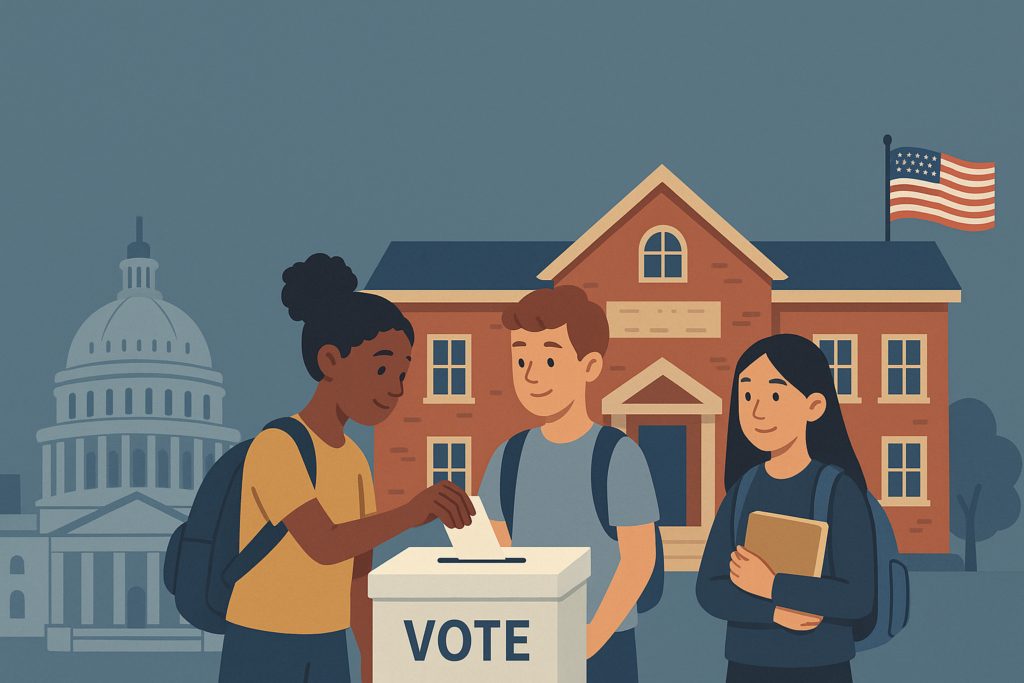ICSE
10-18Y
CAIE
14-16Y
IBDP
16-18Y

10-18Y
14-16Y
16-18Y


Education is more than textbooks and exams it is also about shaping individuals who can contribute to society. In this context, the relationship between democracy and education becomes very important. A strong democracy relies on citizens who are informed, responsible, and active. Schools, therefore, play a major role in building these qualities from a young age. Many international schools in Bangalore also focus on nurturing these values by combining academic knowledge with life skills, ensuring that students grow into responsible and engaged citizens of tomorrow.
Democracy and education are deeply connected. Democracy gives people the right to participate in decision-making, and education gives them the knowledge and skills to do so effectively. Without education, citizens may not fully understand their rights and responsibilities. Without democracy, education may become limited and one-sided.
Education in a democratic society aims to create free-thinking individuals who respect diversity, value equality, and are willing to work for the common good. This means schools are not just places of academic learning but also training grounds for citizenship.
The importance of democracy in education lies in its power to shape values such as freedom, equality, and justice. In classrooms, students learn about respecting others, listening to different opinions, and solving problems peacefully. These lessons go beyond academics—they prepare children to live as active and thoughtful citizens.
When students experience fairness, open discussions, and equal opportunities in schools, they carry these democratic principles into their adult lives. This ensures that democracy is not just a system of government but a way of life.
The role of schools in democracy is to act as miniature democratic societies. Classrooms become spaces where students practice decision-making, learn cooperation, and develop leadership skills. For example:
Through these experiences, students see democracy in action rather than just reading about it. This prepares them to take part in civic life later on.
Democracy needs citizens who are not only educated but also responsible. That is why schools focus on education for responsible citizens. This includes:
When students understand that their choices affect society, they are more likely to make ethical decisions. Such education helps them grow into active participants in democracy rather than passive observers.
The connection between democracy and student development is clear. A democratic learning environment encourages curiosity, confidence, and independence. Students are allowed to ask questions, challenge ideas, and develop critical thinking skills.
For example, when a teacher encourages students to debate a topic, they not only learn the subject but also gain confidence to express their views. Similarly, when group activities are based on equal participation, students learn cooperation and tolerance. This holistic growth is essential for creating balanced individuals who can contribute positively to society.
Schools are the first place where children experience the values of democracy in schools. These values include:
By practicing these values daily, children develop habits that last a lifetime. When they grow up, these values guide them as citizens, workers, and leaders in society.
Citizenship education in schools teaches students how to be active and responsible members of society. This is usually done through subjects like civics, history, and social studies, but it also goes beyond the curriculum.
Activities such as:
help children understand the meaning of citizenship. They learn that being a citizen is not just about enjoying rights but also about fulfilling duties.
The relationship between democracy and education is like two sides of the same coin. Education supports democracy by creating informed citizens, and democracy supports education by giving equal opportunities for learning.
If education becomes biased or limited, democracy suffers because citizens may not think critically. On the other hand, when democracy is strong, education becomes more inclusive and accessible. Together, they create a cycle that strengthens both society and governance.
One of the most effective ways of linking democracy and education is by teaching democracy in classrooms. Teachers can introduce democratic practices in everyday learning. For example:
Such practices give children practical experience of democratic values. This makes learning real and relevant, preparing them for active roles in the wider community.
While schools play an important role, there are challenges in fully practicing democracy in education. Some schools may focus too much on exams and less on values. In other cases, students from disadvantaged backgrounds may not get equal opportunities.
To overcome these challenges, schools must balance academics with civic education, ensure inclusivity, and train teachers to model democratic behavior. By addressing these issues, the true link between democracy and education can be strengthened.
The connection between democracy and education is vital for the growth of individuals and nations. Schools are not just centers of learning but also platforms for practicing democracy. By teaching values such as equality, freedom, responsibility, and moral values, they prepare children to become active citizens.
The importance of democracy in education lies in building a society where people can think critically, respect diversity, and participate in decision-making. Through the role of schools in democracy, students experience democratic values, develop as individuals, and learn the true meaning of citizenship.
In short, education builds citizens, and democracy gives them the space to act. Together, they create a stronger, fairer, and more responsible future.
Q1. What is the relationship between democracy and education?
Education supports democracy by creating informed and responsible citizens, while democracy ensures equal access and freedom in education.
Q2. Why is democracy important in education?
It is important because it teaches values like freedom, equality, and justice, helping students become thoughtful and active citizens.
Q3. How do schools promote democracy?
Schools promote democracy by encouraging participation, fairness, student councils, group activities, and open discussions in classrooms.
Q4. What is citizenship education in schools?
Citizenship education helps students understand their rights and responsibilities, encouraging them to contribute positively to society.
Q5. How can teachers teach democracy in classrooms?
Teachers can teach democracy by involving students in decision-making, creating fair rules, encouraging debates, and promoting teamwork.